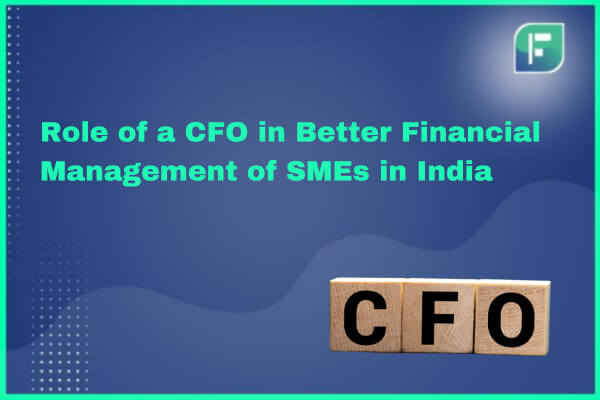As the Indian economy continues to grow, SMEs are important to push the economy and employment creation. Still, the complexities of financial management remain a tough task for most SMEs and frequently result in ineffective resource allocation, cash flow issues and missed development potentials. This is where the CFO in SMEs can really help with Financial stewardship and strategic guidance.
Importance of Financial Management in SMEs
Any effective business, of any industry or size, depends on good financial management. This is particularly important for SMEs who usually have limited resources and compete extremely fiercely. Bad financial management could cause cash flow issues, ineffective use of money, missed development opportunities & financial failure of the company.
The Role of a CFO in SMEs
A CFO in MSMEs is the partner that manages the financial activities of an enterprise, helps it comply with laws and offers information to support decision-making. In an SME context, the job of a CFO is even more complex and also has responsibility for the financial growth and health of the business. These are the roles of a CFO:
Financial Planning & Forecasting
An important role of a CFO or Virtual CFO services within an SME is developing and putting into action effective financial plans and forecasting models. This includes analysing historical data, analysing market developments and also predicting future financial requirements. By preparing correct financial projections, a CFO can guide SMEs in making sound choices regarding resource allocation, investment opportunities and risk management.
Cash Flow Management
Cash flow will be the foundation of any company and cash flow challenges are especially prevalent amongst SMEs. A CFO in MSMEs oversees cash flow monitoring and optimisation through effective invoicing and collection, negotiating favourable payment terms with suppliers and evaluating alternative financing when appropriate.
Cost Control and Optimisation
In an increasingly competitive business environment, optimisation and cost control are important to hold profitability and enhance operational effectiveness for SMEs. A CFO in SMEs can identify unnecessary spending areas, put into action cost-saving actions and automate processes to reduce overhead expenses.
Financial Reporting and Compliance
Proper and timely financial reporting is important for SMEs to remain transparent, meet regulatory needs and draw in potential investors or even lenders. A CFO in SMEs prepares economic statements consistent with generally accepted accounting principles and applicable industry standards. Also, they oversee internal controls and compliance with tax regulations along with other legal obligations.
Risk Management
SMEs commonly face several risks including fluctuating markets, cybersecurity risks and operational uncertainties. A CFO in SMEs can identify, evaluate and mitigate these risks through good risk management.
Strategic Planning & Decision Support
Beyond financial management, a CFO in SMEs is a strategic adviser to the leadership group, offering analysis and insight to aid in good decision-making. They can evaluate possible growth opportunities, establish the financial viability of new initiatives or projects and suggest appropriate action based on financial data and market trends.
Talent Management and Development
In a lot of SMEs, the CFO might also oversee the finance and accounting team, ensuring sufficient talent and building professionals. This includes recruiting and retaining competent finance professionals and education programs along with a culture of continual improvement and learning in the finance division.
Challenges & Considerations for CFOs in SMEs
Even though the advantages of having a dedicated CFO are evident, SMEs frequently face special challenges in attracting and keeping high finance talent. Limited resources and budgetary constraints might not permit a full-time, skilled CFO.
Final Thoughts
Effective financial management is a fundamental skill for SMEs in India. A CFO in SMEs is responsible for maintaining solid financial procedures, optimum resource allocation, strategic guidance and risk mitigation to support sound decision-making. Accepting the expertise of a CFO will assist SMEs with their financial management, operational effectiveness and position for long-term growth and profits.
FAQs
What are the essential duties of a CFO within a SME?
The main duties of a CFO in SMEs will be financial planning and forecasting, cash flow management, price management and optimisation, financial reporting & compliance, risk management, strategic choice and planning help and talent management in the financial group.
How can a CFO control cash flow for an SME?
A CFO in SMEs will bill and also collect cash, negotiate better payment terms with vendors and explore alternate funding in case required. They can also detect cash leakage areas and modify working capital to keep cash flow.
How does a CFO handle risk for an SME?
The role of the CFO in determining, analysing and lowering the risks is essential for an SME, including industry variations, operational uncertainties and cybersecurity threats. They create contingency plans, buy enough insurance and create internal controls to safeguard the company’s finances and assets.
How can a CFO support future business planning and decision making of an SME?
A CFO in SMEs advises the leadership team strategically offering data and insight to make a decision. They assess probable growth prospects and the financial viability of new initiatives or projects and recommend suitable action based on financial details and market trends.
How can SMEs approach hiring a full time CFO?
Limited funds and budgetary hurdles often prevent SMEs from recruiting and keeping top finance talent. Another hurdle might be that some SME owners are hesitant to give up control of financial decisions or deem the price of a full time CFO as unneeded.
What are alternative methods for SMEs to get CFO level expertise?
SMEs also can consider employing an interim or part-time CFO, outsourcing certain financial functions or utilising automation and technology to simplify financial processes. Such options might offer CFO level expertise with appropriate resources and costs.






 Call to Expert
Call to Expert